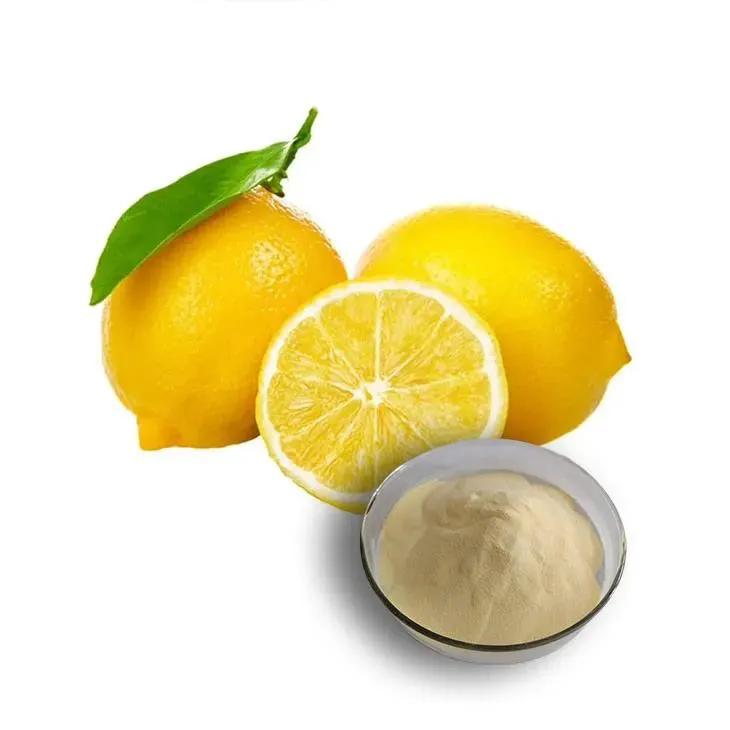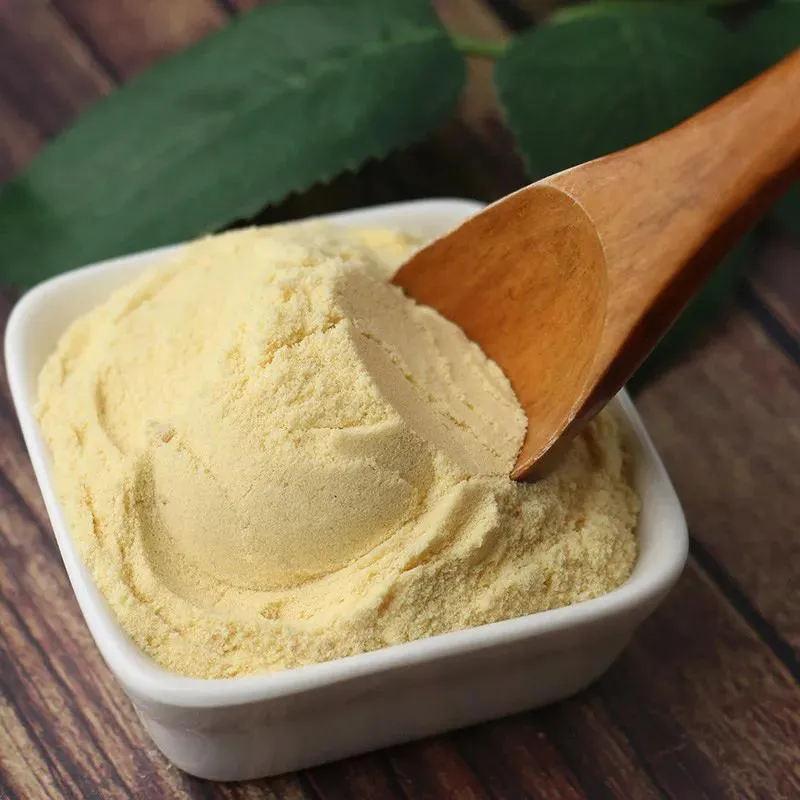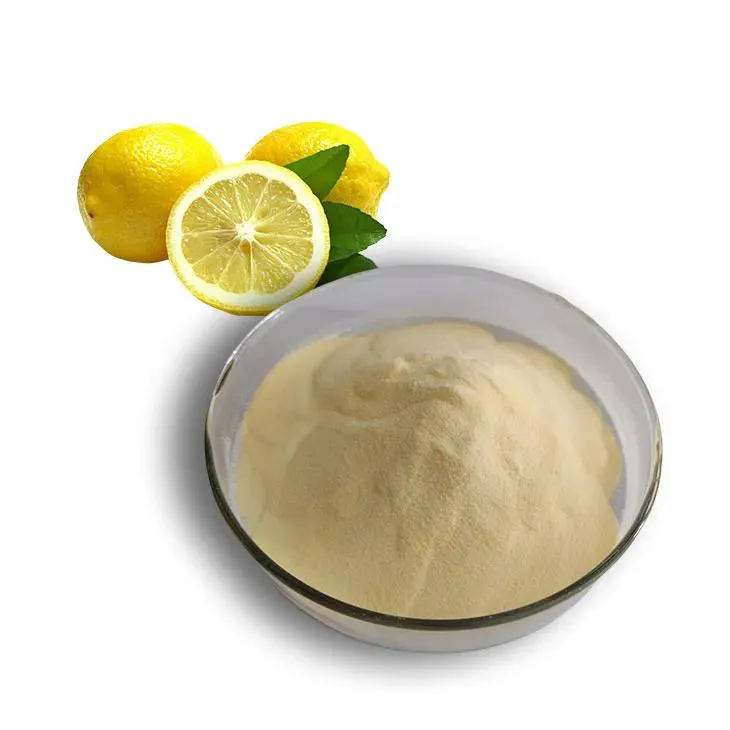- 0086-571-85302990
- sales@greenskybio.com
Lemon Juice Powder Manufacturer.
2024-12-02

Introduction
Lemon Juice Powder manufacturers play a crucial role in the global food ingredient market. They are the ones who turn fresh lemons into a powder form that is both stable and convenient to use. This transformation process is not a simple task but involves a series of carefully orchestrated steps.

The Production Process
Harvesting
The first step in the production of Lemon Juice Powder is harvesting the lemons. Manufacturers need to ensure that the lemons are harvested at the optimal time. This is essential for obtaining the maximum juice yield and the best quality. Lemons that are harvested too early may not have fully developed their flavor and nutrient content, while those harvested too late may start to lose some of their desirable qualities.
Extraction
After harvesting, the extraction process begins. The goal of this step is to capture all of the essential elements of the lemon juice. This includes not only its characteristic tangy flavor but also its beneficial nutrients. Manufacturers use various techniques to ensure a thorough extraction. For example, they may use mechanical presses or centrifugal methods to separate the juice from the pulp and other components of the lemon.
Conversion from Liquid to Powder
One of the major challenges for Lemon Juice Powder manufacturers is to maintain the integrity of the product during the conversion from liquid to powder. This requires the use of specialized equipment and techniques.
Advanced drying techniques are often employed. For instance, spray drying is a common method. In spray drying, the lemon juice is sprayed into a hot air chamber. As the droplets of juice are exposed to the hot air, the water in the juice evaporates rapidly, leaving behind a fine powder. Another method is freeze - drying, which involves freezing the lemon juice first and then removing the water through sublimation. These drying techniques help in preserving the natural characteristics of the lemon juice, such as its flavor, aroma, and nutrient content.

Quality Control
Throughout the production process, strict quality control measures are implemented. Manufacturers need to ensure that the final product meets certain standards in terms of purity, flavor, and nutrient content.
- They test the raw materials, i.e., the lemons, for any contaminants or pesticides before processing.
- During the extraction and drying processes, samples are regularly taken to monitor the quality of the juice and the powder being formed.
- Final product testing includes analysis of the powder's solubility, flavor stability, and nutrient levels. For example, the vitamin C content in the lemon juice powder is an important parameter that needs to be accurately measured.

Research and Development
Lemon juice powder manufacturers are not just focused on production; they are also actively involved in research and development (R & D). R & D efforts are aimed at improving various aspects of the product.
Enhancing Solubility
One area of R & D is to enhance the solubility of the powder. Solubility is important as it affects how well the powder can be incorporated into different products. For example, in the food processing industry, if the lemon juice powder is not highly soluble, it may form lumps when added to beverages or other products. Manufacturers may experiment with different additives or modify the production process to improve solubility.
Improving Flavor Stability
Another aspect is improving flavor stability. Lemon juice powder may lose some of its flavor over time, especially when exposed to certain environmental conditions such as heat, light, or moisture. R & D teams may study ways to encapsulate the powder or use additives that can protect the flavor molecules, ensuring that the lemon - like tangy flavor remains intact for a longer period.
Developing New Product Variants
Manufacturers also strive to develop new product variants. This could include creating lemon juice powder with added ingredients such as other fruits or herbs for a more complex flavor profile. In the pharmaceutical industry, they may develop lemon juice powder - based products with specific ratios of nutrients for different health applications.

Applications in Different Industries
Food Processing Industry
In the food processing industry, lemon juice powder is widely used. It is a popular ingredient for creating flavored snacks. For example, it can be used in the production of lemon - flavored crackers, chips, or candies. The powder form is convenient as it can be easily measured and added to the production process. It also provides a consistent flavor compared to using fresh lemon juice, which may vary in flavor depending on the season and quality of the lemons.
Lemon juice powder is also used in baking. It can add a tangy flavor to cakes, muffins, and pastries. In the production of beverages such as lemonade, the powder can be used to create a concentrated lemon flavor that can be adjusted according to the desired taste.
Pharmaceutical Industry
The pharmaceutical industry is another major user of lemon juice powder. Lemon juice is a rich source of vitamin C, and the powder form can be used in formulating vitamin - C - rich supplements. These supplements are popular for their immune - boosting properties. The powder can be easily processed into tablets, capsules, or powders for direct consumption.
Moreover, lemon juice powder may also have other potential health benefits that are being explored in the pharmaceutical field. For example, it may have antioxidant properties or may be beneficial for digestive health. Manufacturers may collaborate with pharmaceutical companies to conduct research on these potential health benefits and develop new products based on them.
Market Trends and Future Outlook
The market for lemon juice powder has been experiencing certain trends in recent years. There is an increasing demand for natural and healthy food ingredients, which has led to a growth in the use of lemon juice powder in various products. Consumers are becoming more health - conscious and are looking for products that are free from artificial flavors and colors.
The globalization of the food and pharmaceutical industries has also contributed to the growth of the lemon juice powder market. With the expansion of international trade, manufacturers have access to a wider range of markets, both for sourcing raw materials and for selling their products.
Looking into the future outlook, there are several factors that may shape the lemon juice powder manufacturing industry. Technological advancements are likely to continue to play a role. For example, new drying techniques or methods for improving product quality may be developed. There may also be an increased focus on sustainability. Manufacturers may need to explore more sustainable ways of sourcing lemons, reducing energy consumption in the production process, and minimizing waste.
Another aspect to consider is the changing consumer preferences. As consumers become more adventurous in their taste preferences, there may be a demand for more innovative lemon - based products. Manufacturers will need to be responsive to these changes and continue to innovate in their product development and marketing strategies.
Conclusion
Lemon juice powder manufacturers are at the heart of a dynamic and growing industry. They face challenges in production, such as maintaining product integrity during conversion to powder, but also have opportunities for growth through research and development and by capitalizing on market trends. Their products are versatile and find applications in diverse industries, from food processing to pharmaceuticals. As the market continues to evolve, these manufacturers will need to adapt and innovate to stay competitive and meet the changing demands of consumers.
FAQ:
Q1: What are the key steps in the production of lemon juice powder?
The key steps include carefully harvesting lemons at the right time for maximum juice yield and quality. Then there is an extraction process to capture all the essential elements of the lemon juice. Maintaining the integrity of the product during the conversion from liquid to powder using specialized equipment and techniques, such as advanced drying techniques, is also crucial.
Q2: How do lemon juice powder manufacturers ensure product quality?
They ensure product quality by starting with proper lemon harvesting. During extraction, they aim to get all the important aspects like flavor and nutrients. They also use advanced drying techniques to preserve the natural characteristics when changing the juice to powder. Additionally, continuous research and development to enhance solubility, flavor stability, etc. also contribute to quality assurance.
Q3: Why is it challenging to convert lemon juice to powder?
It is challenging because the manufacturers need to maintain the integrity of the product during this conversion. This means preserving all the essential elements like the tangy flavor and beneficial nutrients while changing from a liquid to a powder form.
Q4: In which industries are lemon juice powder products in high demand?
Lemon juice powder products are in high demand in the food processing industry, for example, for creating flavored snacks. They are also needed in the pharmaceutical industry for formulating vitamin - C - rich supplements.
Q5: What kind of research and development do lemon juice powder manufacturers engage in?
They engage in research and development such as exploring ways to enhance the solubility of the powder, improve its flavor stability, or develop new product variants.
Related literature
- The Production and Quality Control of Fruit Juice Powders"
- "Advances in Drying Techniques for Citrus - Based Products"
- "Lemon Juice Powder: Applications in Food and Pharmaceutical Industries"
- ▶ Hesperidin
- ▶ Citrus Bioflavonoids
- ▶ Plant Extract
- ▶ lycopene
- ▶ Diosmin
- ▶ Grape seed extract
- ▶ Sea buckthorn Juice Powder
- ▶ Fruit Juice Powder
- ▶ Hops Extract
- ▶ Artichoke Extract
- ▶ Mushroom extract
- ▶ Astaxanthin
- ▶ Green Tea Extract
- ▶ Curcumin
- ▶ Horse Chestnut Extract
- ▶ Other Product
- ▶ Boswellia Serrata Extract
- ▶ Resveratrol
- ▶ Marigold Extract
- ▶ Grape Leaf Extract
- ▶ New Product
- ▶ Aminolevulinic acid
- ▶ Cranberry Extract
- ▶ Red Yeast Rice
- ▶ Red Wine Extract
-
Nettle Root Extract
2024-12-02
-
Curcuma Longa Extract/Turmeric extract
2024-12-02
-
Artichoke Extract
2024-12-02
-
American Ginseng Root Extract
2024-12-02
-
Lily extract
2024-12-02
-
Hops Extract
2024-12-02
-
Shikone Extract
2024-12-02
-
Troxerutin
2024-12-02
-
Berberis aristata Extract
2024-12-02
-
Licorice Root Extract Powder
2024-12-02





















